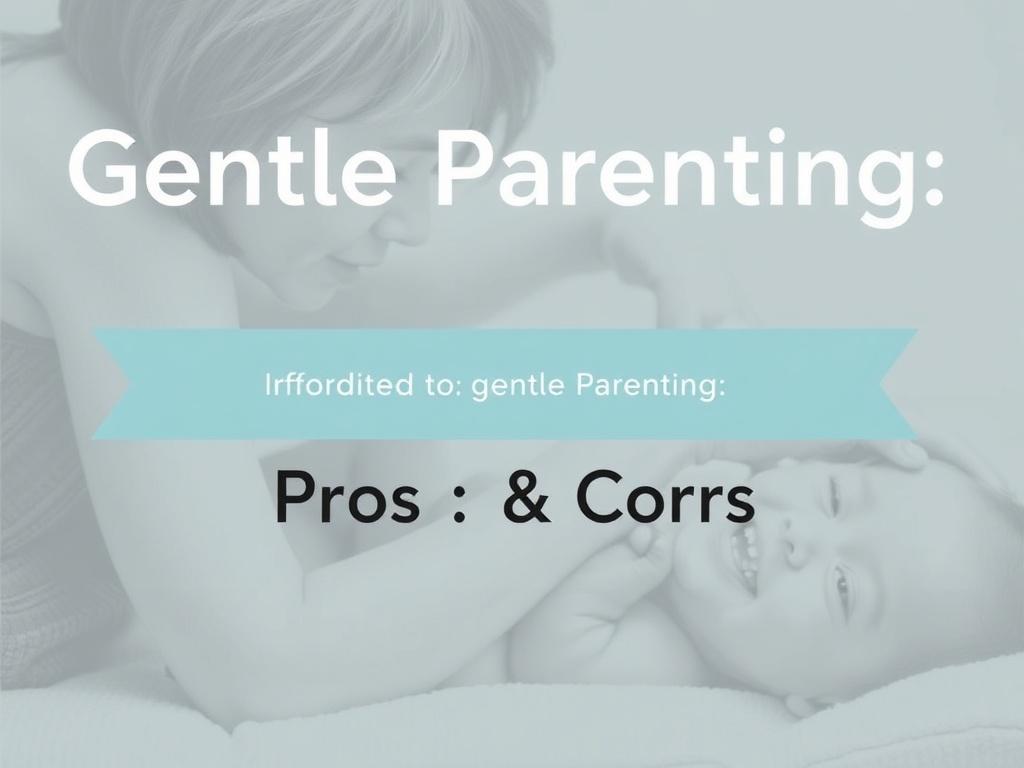SQLITE NOT INSTALLED
Introduction to Gentle Parenting

Parenting is one of the most profound journeys in life, filled with countless choices and challenges. Among the many different styles available today, gentle parenting has gained a lot of attention. Many parents are drawn to this approach because it promises a compassionate and respectful way to raise children. But what exactly is gentle parenting? And, more importantly, what are the pros and cons of using this method?
In this detailed article, we will explore gentle parenting from all angles. By the end, you’ll have a clear understanding of what this parenting style entails, how it compares to others, and whether it might be the right fit for your family.
What is Gentle Parenting?
Gentle parenting is a philosophy that prioritizes empathy, respect, and understanding in the way parents interact with their children. Instead of relying on punishment or harsh discipline, gentle parents focus on communication, emotional connection, and setting firm yet kind boundaries.
This parenting style encourages recognizing children as whole, capable individuals who deserve respect and care. The emphasis is on nurturing emotional intelligence, helping kids understand their feelings, and guiding them with patience and love.
Unlike traditional parenting methods that may lean on obedience and authority, gentle parenting is rooted in cooperation and trust. Parents are encouraged to get to the heart of misbehavior by understanding the child’s needs or emotions underlying the actions.
Core Principles of Gentle Parenting
- Empathy – Understanding children’s feelings and perspectives.
- Respect – Treating children as individuals worthy of dignity.
- Positive communication – Using kind words and active listening.
- Boundaries – Setting consistent limits without harshness.
- Connection – Fostering a strong emotional bond with children.
Why Parents Choose Gentle Parenting
Many parents are frustrated with the traditional “because I said so” style of discipline, and they look for alternatives that feel more nurturing and less authoritarian. Gentle parenting aligns with modern research on child development that highlights the importance of emotional health and attachment.
Here are some of the common reasons why parents opt for this approach:
- They want to strengthen the parent-child relationship through trust rather than fear.
- They believe children learn better with guidance than with punishment.
- They want to raise emotionally intelligent and empathetic kids.
- They seek to reduce power struggles and tantrums by addressing the root of behavior issues.
- They want a more peaceful family environment with less yelling or conflict.
The Pros of Gentle Parenting
The benefits of gentle parenting are numerous and well-documented by both experts and families who practice it. Let’s explore some of the most significant advantages:
1. Builds Strong Emotional Bonds
Gentle parenting emphasizes empathy and connection, which naturally leads to a closer parent-child relationship. When children feel genuinely heard and valued, they develop a secure attachment to their parents. This emotional safety is foundational to a child’s sense of well-being and confidence.
2. Cultivates Emotional Intelligence
Children raised with gentle parenting learn to recognize and express their emotions in healthy ways. Instead of suppressing feelings or acting out, they discover how to communicate their needs effectively. This skill is invaluable not only in childhood but throughout life.
3. Encourages Self-Discipline
Rather than relying on external punishments or rewards, gentle parenting encourages children to develop internal motivation and self-regulation. When children understand why certain behaviors are important and feel respected, they are more likely to choose good actions on their own.
4. Reduces Behavioral Problems
Many parents find that this approach actually decreases tantrums, defiance, and other behavior issues over time. When children’s emotional needs are met and their frustrations understood, they’re less likely to act out. This creates a more peaceful home environment.
5. Prepares Children for Healthy Relationships
By modeling respectful communication and empathy, gentle parents set children up for successful and empathetic relationships with others in their lives. This approach teaches valuable social skills that contribute to cooperation and mutual respect.
The Cons of Gentle Parenting

Despite its many benefits, gentle parenting is not without its challenges. It requires patience, consistency, and emotional energy, which can be difficult for many parents to sustain. Here are some of the potential downsides:
1. Time and Energy Intensive
Gentle parenting requires parents to be emotionally present and actively engaged. This can be exhausting, especially for those juggling work, household duties, and other stressors. The need for calmness and patience during conflicts takes a lot of effort.
2. Ambiguity About Boundaries
Since gentle parenting avoids harsh discipline, some parents struggle with setting and enforcing boundaries clearly. It can sometimes result in inconsistent discipline, which may confuse children about what is acceptable behavior.
3. Misinterpretation as Permissiveness
Some people mistakenly believe that gentle parenting means letting children do whatever they want. This misunderstanding can lead to criticism from family members, teachers, or friends who prefer more traditional discipline styles.
4. Challenging in Public or Social Settings
Practicing gentle parenting outside the home—especially in public places or during social events—can be difficult. The time it takes to calmly talk through behavior or meltdowns may not always be feasible, and societal expectations can sometimes pressure parents to react more quickly or firmly.
5. Requires Parents to Manage Their Own Emotions Well
Gentle parenting pushes parents to maintain emotional control and reflect on their feelings. This process can be challenging, especially if a parent is dealing with their own stress, exhaustion, or past trauma. It’s not always easy to respond gently when feeling overwhelmed.
Gentle Parenting vs. Other Parenting Styles

To better understand gentle parenting, it’s helpful to compare it to other popular parenting approaches. Below is a table outlining the differences:
| Parenting Style | Approach to Discipline | Parent-Child Relationship | Focus |
|---|---|---|---|
| Gentle Parenting | Non-punitive, empathetic guidance | Collaborative and respectful | Emotional connection and understanding |
| Authoritarian | Strict rules, punishment-based | High control, low warmth | Obedience and discipline |
| Permissive | Few rules or limits | Warm but indulgent | Freedom with little structure |
| Authoritative | Clear rules with reasoned discipline | High warmth and high control | Balance of independence and guidance |
As you can see, gentle parenting shares similarities with authoritative parenting due to the focus on respect and communication but leans more strongly toward empathy and emotional validation.
Practical Tips for Implementing Gentle Parenting
If you’re interested in trying out gentle parenting, it may feel overwhelming at first. Here are some practical steps to get started without feeling lost:
1. Practice Active Listening
Try to give your child your full attention when they speak. Validate their feelings, even if you don’t agree with their point of view. For example, say, “I see that you’re upset because you wanted to play longer.” This helps children feel understood.
2. Use Positive Language
Instead of telling your child what not to do, focus on what they should do. For instance, say “Please walk inside” rather than “Don’t run.” Positive framing encourages cooperation.
3. Offer Choices When Possible
Children gain a sense of autonomy when they can make simple choices. This reduces power struggles. For example, “Would you like to wear the red shirt or the blue one today?”
4. Set Clear and Consistent Boundaries
Gentle parenting is not permissive. It’s important to be consistent with rules so children understand limits. When boundaries are crossed, respond with calm explanations rather than punishment.
5. Model Emotional Regulation
Children learn a lot by watching their parents. Demonstrate how to manage frustration or anger calmly. You might say, “I’m feeling a bit stressed, so I’m going to take a deep breath.”
Common Misconceptions About Gentle Parenting
Because gentle parenting challenges many traditional ideas about discipline, it is often misunderstood. Clearing up these misconceptions can help you decide if this approach resonates with you:
- Misconception: Gentle parenting means no rules.
Truth: It involves setting respectful and clear limits without harsh punishment. - Misconception: It’s only for children who misbehave a lot.
Truth: Gentle parenting is for every child and aims to prevent behavior issues before they start. - Misconception: It’s easier than other parenting styles.
Truth: It requires more patience and emotional work from parents. - Misconception: It spoils children.
Truth: It teaches responsibility and respect through guidance, not indulgence.
How Gentle Parenting Affects Child Development
Research shows that children raised with principles of gentle parenting often experience positive developmental outcomes:
- Improved emotional resilience – Kids learn how to bounce back from stress.
- Better social skills – Empathy encourages cooperation and friendships.
- Greater self-esteem – Feeling valued boosts confidence.
- Lower levels of anxiety and aggression – Emotional regulation reduces outbursts.
It’s important to remember that no parenting style is perfect or guaranteed to work in every situation. However, gentle parenting offers a foundation for nurturing well-rounded, compassionate individuals.
Challenges Parents Face Using Gentle Parenting
While gentle parenting is empowering, parents often face real challenges in putting it into practice. Some common difficulties include:
- Handling public meltdowns calmly without feeling judged by others.
- Balancing gentleness with the need for authority and discipline.
- Dealing with their own upbringing, which may have been far from gentle.
- Finding support from family or community members who may not understand this style.
- Managing stress and fatigue that can make gentle responses feel impossible.
Solutions to these challenges often involve community support, parenting groups, and personal self-care strategies.
Real-Life Examples of Gentle Parenting in Action
Examples provide the clearest picture of how gentle parenting looks day-to-day. Consider these common scenarios and responses:
| Situation | Gentle Parenting Response |
|---|---|
| A toddler throws a toy out of frustration. | Say, “I see you’re upset because the toy isn’t working the way you want. Can you tell me what’s wrong?” Then help them find a better way to express feelings. |
| A child refuses to do homework. | Validate feelings: “Homework feels hard sometimes, doesn’t it?” Then collaborate: “Let’s take a short break and then tackle it together.” |
| Sibling rivalry leads to fighting. | Intervene calmly, listen to each side, and guide them in using words rather than hitting to express anger. |
Resources for Parents Interested in Gentle Parenting
If you want to dive deeper into gentle parenting, plenty of books, websites, and communities can offer guidance and support. Here are some recommended resources:
- Books: “The Gentle Parent” by L.R. Knost, “No-Drama Discipline” by Daniel J. Siegel and Tina Payne Bryson
- Websites: gentleparenting.com, ahaparenting.com
- Parenting forums and groups: Many Facebook groups and local parenting circles focus on gentle parenting methods.
- Workshops: Seek local workshops or online classes to gain hands-on strategies.
Conclusion: Is Gentle Parenting Right for You?
Gentle parenting is more than just a style; it’s a mindset that shapes how you see your child and your role as a parent. Its pros, including fostering deep connections and emotional intelligence, make it incredibly appealing. However, the cons such as the high emotional demand on parents and challenges in maintaining boundaries are important to consider.
If you value empathy, communication, and respect in your family life, gentle parenting may align beautifully with your goals. Like any approach, it requires practice and patience but can ultimately lead to a more peaceful and fulfilling relationship with your child.
Remember, no parent is perfect, and every child is unique. Feel free to adapt gentle parenting principles in a way that works best for your family. The key is to always come from a place of kindness, understanding, and love.
Thank you for reading this comprehensive look at gentle parenting. We hope it has helped clarify the pros and cons, giving you insight into this compassionate way of raising children.
